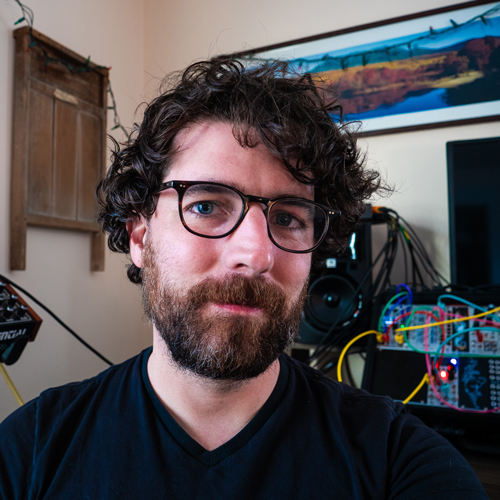Associate Professor of Music
Creative Arts Department
Education
Ph.D., Music Theory, Columbia University
MA, Music Theory, Columbia University
B.Mus, Music Performance, Oberlin Conservatory of Music
BA, Politics, Oberlin College
About
Will Mason is a composer, performer, and writer. His eclectic scholarly and performance interests encompass electronic music, avant-garde jazz, microtonality, and modern composition, alongside an abiding interest in the natural world and the wintry landscapes of his native Maine. His music has been praised as “experimental yet still catchy” by the New York Times, and for mixing “composition and improvisation, decorum and din” by the Boston Globe.
Mason’s current project is “Hemlocks, Peacocks,” a suite of music for alto saxophone, tenor saxophone, retuned fender rhodes, and drums. That project features Daniel Fisher-Lochhead, Anna Webber, and deVon Russell Gray and was released in January 2025 on New Focus Recordings. It was praised as “an unsettling and revelatory work” by PopMatters, and JazzTimes wrote that its harmonies “reveal another tonal language, dark and enveloping.”
His debut album as a composer + bandleader was with the Will Mason Ensemble, a jazz-inflected septet. That album, Beams of the Huge Night, was released on New Amsterdam Records in 2015. The Boston Globe wrote that Mason’s compositions “balance improvisation and composition, and are shot through with asymmetrical melodies and grooves, grinding harmonies, and atmospheric bouts of stillness.”
Mason also leads and writes the music for the group Happy Place, an avant-rock band of two guitars and two drummers. The band recorded their debut album Northfield, which was released in 2016 on Exit Stencil Records. The New York Times wrote that the band “succeeds at fusing experimental rock and chamber music…The cathartic two-guitar attack has the feel of avant-rock, while the astringent harmony recalls experiments by Charles Ives.”
Recent commissions include pieces for Nouveau Classical Project and Michi Wiancko. Musicians Mason has performed with include Ned Rothenberg, Anna Webber, Matt Mitchell, Leila Bordreuil, Elias Stemeseder, Greg Chudzik, Miles Okazaki, Kate Gentile, Marc Hannaford, and Andrew Smiley.
Mason’s scholarly interests focus on the analysis of electronic and electroacoustic music, music and media theory, and embodied cognition. He is especially interested in the intersection of the tools of the recording studio and the mind’s faculties of imagination and mimesis. He is co-editor of the Oxford Handbook of Spectral Music, and has authored entries for Grove Music Online. He has presented his work internationally, including at annual meetings of the Society for Music Theory, American Musicological Society, and Society for American Music.
Publications
CDs
Will Mason Quartet – Hemlocks, Peacocks. New Focus Recordings. 2025.
Happy Place – Tendrils. Exit Stencil Records. 2020.
Happy Place – Northfield. Exit Stencil Records. 2016.
Will Mason Ensemble – Beams of the Huge Night. New Amsterdam Records. 2015
Books
Oxford Handbook of Spectral Music, co-edited with Amy Bauer and Liam Cagney. Forthcoming.
Things I like
6 books that changed how I listen to and think about music:
- Becker – Deep Listeners: Music, Emotion, and Trancing
- Cox – Music and Embodied Cognition
- Cumming – The Sonic Self
- Emmerson – Living Electronic Music
- Lewis – A Power Stronger Than Itself: The AACM and American Experimental Music
- Tomlinson – A Million Years of Music
6 scholarly books that aren’t about music but inspire my work:
- Braidotti – The Posthuman
- Clark – Natural Born Cyborgs
- Gombrich – Art and Illusion
- Krauss – The Optical Unconscious
- Schivelbusch – The Railway Journey
- Sobchak – The Address of the Eye
12 Desert Island cds:
- Ornette Coleman – Complete Science Fiction Sessions
- John Coltrane – Sun Ship
- Miles Davis – Miles Smiles
- Eric Dolphy – Out to Lunch
- Holly Herndon – Platform
- Mahalia Jackson – Live at Newport 1958
- Keller Quartet – Complete string quartets of György Kurtág
- Lightning Bolt – Wonderful Rainbow
- Yvonne Loriod – Olivier Messiaen’s “Vingt Regards sur l’Infant Jesus”
- Meshuggah – Catch 33
- Björk – Post
- Radiohead – Kid A
Research and Teaching Interests
- Western music theory
- Music technology (creative/compositional, critical, and historical approaches)
- Media theory
- Embodied music cognition
- Musical timbre
- Modernism and the avant-garde in music and the visual arts in Europe and North America
- Microtonality
- Musical representations of landscape and nature
- Jazz
More generally, I’m motivated by the belief that doing and knowing are inseparable; that creating interesting music requires being curious and open to experimenting; that music is fundamentally social, active, and collaborative; that, because music is non-representational (or at least not obviously representational) it provides an exceptionally potent set of texts/practices for students to use to explore ideas that animate the study of the liberal arts more broadly.
Courses Taught:
- Music 114 – Music Theory I: Fundamentals of Harmonic Practice
- Music 115 – Music Theory II: Tonal Harmony
- Music 198 – Creative and Critical Approaches to Music Technology
- Music 308 – Analytic Survey of Western Music
